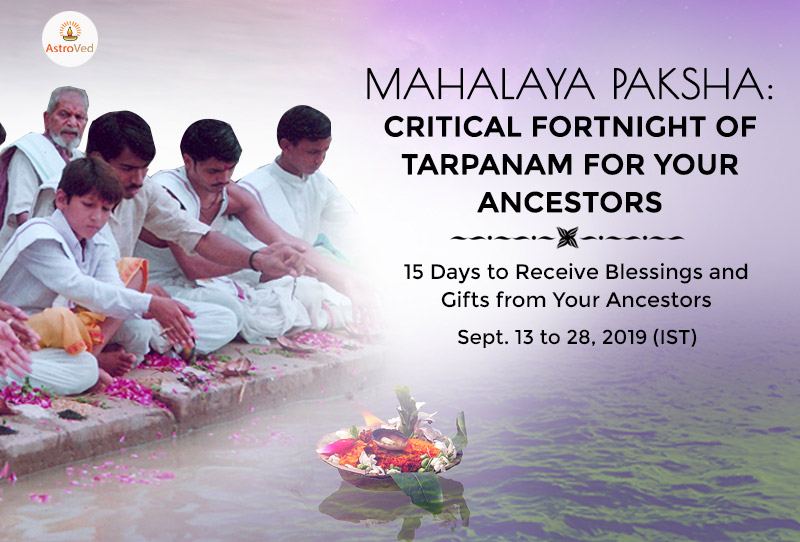Tarpana or Tarpanam ceremony is a sacred Vedic ritual, where the ancestors and divine entities are appeased by giving them food, drink, and special prayers. Tarpanam also refers to Argya, which means ‘offerings to Gods, Demi-Gods, and ancestors.’ It is often a concoction of substances like water, milk, sugar, saffron, cardamom, and camphor, which is a particular offering to the Gods.
“Tilatarpanam” involves libations, offered to the departed ancestors. After leaving the earth, the departed souls reach the “Pitruloka” and live there for a specific period in their astral bodies. In this state, they only depend upon the offerings of their descendants made on earth for them. Performing the Tilatarpanam ritual can supply the ancestors with the essential nutrients they need to live in the Pitruloka.
Any defaults in this regard would invite Pitru Dosha and would be considered one of the curses that anyone could invoke in their lifetime. If the souls of the departed are in a state of unrest, it creates turbulence for the families of the departed. On the contrary, the ancestors are considered as the guardian angels of a family, and the way to invoke their blessings is to enable them to reach Pitruloka. If we perform the sacred rituals and ceremonies properly, they will guard the family like an amulet.

Hand Postures used While Offering Tarpana:
It is important to note that there is a separate hand posture for each worship. For Devas, the offering is made to flow over the four fingers of the right hand other than the thumb. While offering Tarpana for Rishis, the sacred offering must flow from the left side of the right palm, between the wrist and the little finger. While performing it for the Ancestors, the sacred offerings should flow from the right side of the right palm and to the thumb of the right hand.
Where to Perform the Tarpanam Ceremonies:
Tarpanam Ceremonies can be performed anywhere, which is clean and maintained in a traditional way to accommodate ceremonies. Many people perform Tarpanam at home. Learned and experienced pundits act as guides to perform all the rituals. Rivers and banks of the rivers are considered very sacred. It is appropriate to perform the ceremony in Pilgrim sites and various temples assigned to perform last rites. It is highly auspicious to perform the Tarpanam ceremonies at pilgrim sites and on the banks of holy rivers and water bodies earmarked for this purpose. Special food prepared with black sesame seeds is to be offered along with Tulsi leaves, sandalwood paste, sacred Dharba grass, and some coins.
Importance of Gingelly Oil for Tarpana:
It is a common misconception that Gingelly oil is used for Tarpana, and therefore, it is inauspicious. In reality, it is the favorite oil for Lord Ganesha, Goddess Mahalakshmi, Goddess Saraswati, and Lord Shiva. It also stores much energy and is highly healthy. There is a confusion between Gingelly oil and Sesame oil, as Sesame is obtained from large trees. Thus, it is a common practice to use Gingelly oil for Tarpana.
Benefits of Performing Tarpanam Ceremonies:
Performing Tarpanam will bestow immense benefits to the individuals and the family. The tradition has been passed on for generations.
Mahalaya Paksha is the most critical time of the year for you to perform Tarpanam for your ancestors. Every year during the Mahalaya period, the spirits of your ancestors come to the Earth plane to receive your offerings through Tarpanam and bestow their blessings on you- these blessings have the power to change your destiny. This fortnight window is a time you can seek help from your ancestors to dissolve the karma affecting all aspects of your present life, including your health, wealth, career, and relationships.
- All challenges related to relationships, wealth, and health shall be resolved.
- The Pitru Dosha in the horoscope can be remedied.
- The blessings of the ancestors can be received for peace and longevity.
- The ancestors can be freed from their curse to continue with their subsequent lives.
- Adverse effects and unwanted desires can be curbed, and the kids in the family will be benefitted abundantly.
Your article helped me a lot, is there any more related content? Thanks!